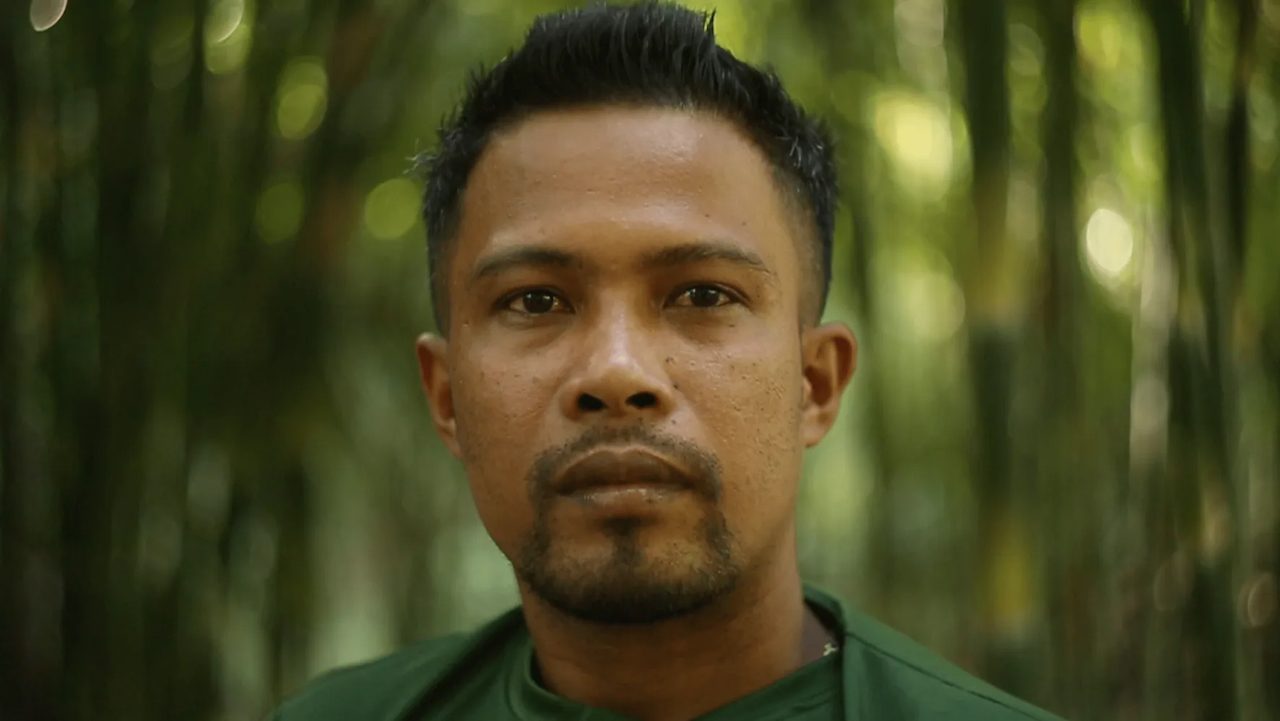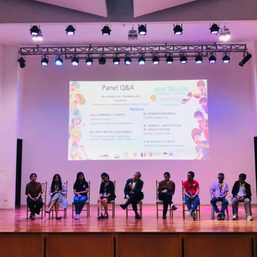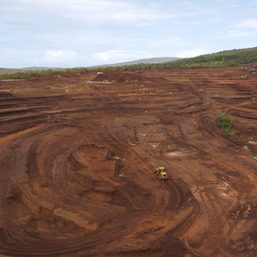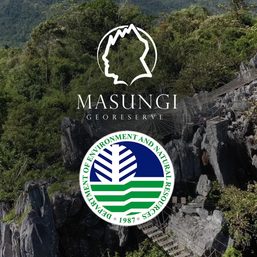SUMMARY
This is AI generated summarization, which may have errors. For context, always refer to the full article.

RIZAL, Philippines – One Saturday afternoon, Kuhkan Maas was preparing to rest after a rainy day’s work when he and his partner, Melvin Akmad, heard a rock hit the wall of the ranger station inside the Masungi Geopark in Baras, Rizal.
Maas asked Akmad to turn off the lights. They were afraid another rock would be thrown inside through the jalousie windows.
Then there were gunshots. Akmad was hit on the head and there was blood on Maas’ neck, spreading fast on the back of his shirt. He felt dizzy. They called the other forest rangers near the area, and in half an hour or so, help finally came.
When the other rangers arrived at the scene, they found Akmad and Maas outside the station, with Maas kneeling beside a mango tree.
This incident happened on July 24, 2021, and news about it broke as soon as the next morning. To this day, however, the culprit has yet to be identified.
A ranger’s work
A month after the incident, Maas went back to work. A typical day for him as a ranger inside the Masungi Geopark includes patrolling the forest grounds, planting native seedlings, and looking after them day and night.
Inside the geopark, located a few kilometers down the more famous georeserve, rangers like Maas are the ones who plant native trees like bignay and banaba. The geopark is the newest project of Masungi, where restoration efforts are ongoing. This is where visitors hike the Legacy Trail and plant seedlings.
He has been doing this work for the past decade, yet in all his years as an environmental defender, he had never encountered such violence until the incident that one afternoon in July.
During his interview with Rappler, Maas wore a printed headgear around his neck, hiding the scar where the bullet was surgically removed. From afar, the scar looked like a birthmark.
Despite the attack, Maas said he did not see himself leaving his job anytime soon. Hailing from Cotabato City, the young Maas was invited by his cousin to transfer near Manila and get a job as a forest ranger.

Now he has a family in Baras. Even after the shooting, his wife did not dissuade him from continuing this line of work. She could only ask him one question: “Hindi ka ba natatakot (Aren’t you scared)?“
“Kaya ko pa naman (I can still do this),“ Maas answered.
“Masaya po ako sa trabaho ko po na mangangalaga ng kalikasan. Kahit nakakatakot, ipagpapatuloy ko pa rin po,” Maas told Rappler. (I am happy with my work protecting the environment. I’ll continue doing this even if it’s scary.)
He said he looked forward to the day his toddler grows up and sees all the trees he planted in Masungi.
But the future in this line of work is often uncertain. Maas and Akmad’s incident is not an isolated case: Since 2013, the Philippines has consistently topped the list of the most dangerous countries in Asia for land defenders. The country’s environmental defenders, scientists, and forest rangers are at risk whenever they’re out in the field, especially those working in areas where illegal logging is rampant.
A solitary journey
In its 20-year conservation history, Masungi has had to deal with countless threats.
Ben Dumaliang, the founder of Masungi Georeserve, is no stranger to the menaces of the job. At 67, Dumaliang has dedicated a third of his life to Masungi.
When Rappler first saw him during a visit in December 2021, he was weeding out stray plants near Silungan, the waiting area near the trailhead of Discovery Trail. On his other hand was a copy of the plan for the Masungi Geopark Project site, which they submitted to the late former environment secretary Gina Lopez after her visit in 2017.
“It is a solitary journey,” Dumaliang admitted when asked about the hazards of the job. “Especially because we are the only party that is hindering vested interests.”
What protects them now, at least, is the attention they’ve been getting from around the world, said Dumaliang. The georeserve won the 2018 Pathfinder Award Special Commendation and was recognized by monthly magazine Vanity Fair.
Masaya po ako sa trabaho ko po na mangangalaga ng kalikasan. Kahit nakakatakot, ipagpapatuloy ko pa rin po.”
Kuhkan maas, masungi forest ranger
While acclaim does not protect rangers from gunshots, the exposure has helped them spread the word about their advocacy and gain supporters.
Despite the hazards of the job, forest rangers remain committed to their tasks, partly because for them, protecting the environment also means serving the public.
As it is located in the Upper Marikina Watershed, Masungi’s reforestation helps drain water when typhoons hit. Because of recovered forests, communities are spared from floods and landslides.
Aside from protecting communities, Masungi is now a sound habitat for endemic species such as the colasisi (Philippine hanging parrot) and the greater musky fruit bat. In 2020, a team of researchers from the University of the Philippines Los Baños discovered in the area a rare microsnail subspecies (Hypselostoma latispira masungiensis), now known as the Masungi microsnail. In their paper, the researchers linked the discovery to the importance of conserving karst landscapes in the Philippines.
Despite evidence that the forests carry scientific and cultural significance, human activities continue to harm them. To this day, the site faces threats from professional squatters, illegal loggers, and quarry firms.
Dumaliang said given the circumstances, the prudent move would be to leave the place.
“We’re tempted to abandon it. But each time I look at the birds that have come back and the trees that will be left behind, I thought –” he said, his voice trailing off.
In an almost exasperated tone, he continued: “We gave them a little hope. And we will abandon them?”
A culture of violence
What happened to Masungi’s forest rangers “is a reality faced by environmental defenders on a daily basis,” Leon Dulce, the national coordinator of Kalikasan People’s Network for the Environment, told Rappler. According to Dulce, the network has been monitoring the situation of environmental defenders in the country since 2012.
In the case of the Masungi rangers, violence comes from “the increasing pressure from competing land and resource uses in the protected area,” Dulce said. Masungi filed a complaint against “illegal” resort owners after a separate attack last February 18, where three of its rangers sustained wounds in their faces and bodies, another three had minor bruises, and two rangers were hospitalized.
The Philippines remains the deadliest country in Asia for land defenders, according to a 2021 report by international nongovernmental organization Global Witness. In 2020, there were 29 documented killings of land defenders in the country.
For years, advocacy groups have been lobbying for the passage of an environmental defense bill, which in the past failed to get even a single committee hearing. This legislation aims to institutionalize a program that would provide legal aid for land defenders and funding to “enable the work of environmental defense.”
In the 18th Congress, Senator Risa Hontiveros called for a probe into the attacks against Maas and Akmad in 2021. Progressive lawmakers in the House of Representatives filed a resolution on February 28, seeking an investigation into attacks against seven Masungi rangers.
But aside from these piecemeal efforts, there is still no visible progress on the issue of the safety of forest rangers.
It is a solitary journey, especially because we are the only party that is hindering vested interests.”
BEN DUMALIANG, MASUNGI GEORESERVE FOUNDER
Call of duty
Without the solid assurance of state intervention, Masungi’s forest rangers are left to fend for themselves, and for them, going back to work is still the best response to threats and danger. It is also the most pragmatic.
In this line of work, where progress is realized in small – almost invisible – increments of change, a long-term vision is required. A forest, after all, does not grow overnight. Regrowing the forest and making it a livable home for diverse flora and fauna have been Masungi’s utmost priority for the last two decades.
Even in a new era challenged by the COVID-19 situation, this continues to be Masungi’s mission.
With a new generation of young conservationists working with them, Dumaliang’s daughter Billie – who is also the managing trustee of Masungi – believes their mission to defend the land will stand the test of time.
Billie is only 28, her sister Ann 29, while some of the staff are in their mid-20s.
“Sabi ko nga sa kanila,” she gestured to the Masungi staff around her during an interview with Rappler, “Mananalo tayo (I always tell the staff: We will win).“
But the next decade is proving to be an uphill climb for conservationists inside and outside Masungi because of the worsening climate crisis situation.
They would also have to deal with companies with vested interests, while collaborating with local government units and the national government to keep forest rangers safe.
Still, the likes of Maas and Akmad will continue showing up – along with the young ones – because there are still weeds to uproot, seedlings to be watered, and forest grounds to be patrolled day in and day out. – Rappler.com
Add a comment
How does this make you feel?
![[OPINION] Masungi as first line of defense and last hope](https://www.rappler.com/tachyon/2022/04/TL-masungi-reserve-Aprll-27-2022.jpg?fit=449%2C449)





There are no comments yet. Add your comment to start the conversation.